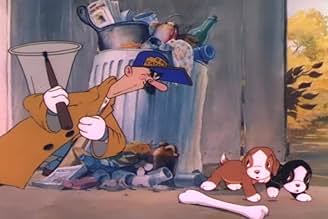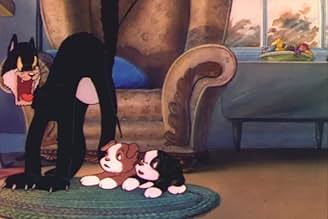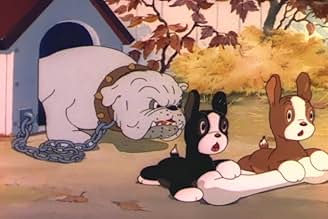The house cat causes the pups, Ruff and Reddy, to run off and then has to retrieve them.The house cat causes the pups, Ruff and Reddy, to run off and then has to retrieve them.The house cat causes the pups, Ruff and Reddy, to run off and then has to retrieve them.
- Director
- Writers
- Stars
Barbara Brewster
- Barking Pups
- (uncredited)
Gloria Brewster
- Barking Pups
- (uncredited)
Rosemary DeCamp
- Housewife
- (uncredited)
Harry Lang
- Cat
- (uncredited)
Dorothy Lloyd
- Barking Pups
- (uncredited)
- Director
- Writers
- All cast & crew
- Production, box office & more at IMDbPro
Featured reviews
When the two cute little puppies annoys the household's cat by innocently tormenting him, he chases them into the city streets, where they get into serious trouble in this Harman-Ising cartoon.
I always admire the technical excellence of the cartoons that Hugh Harman and Rudolf Ising produced for Metro-Goldwyn-Mayer, and this one is no exception, with its lush, 'candybox' style of background art and brilliant Technicolor hues. What frequently annoys me is their frequently sappy, puerile style of storytelling. I suspect they were aimed not at adults who had children and not at children themselves. Those audiences know that children can be little demons. Instead, they seem aimed at the sort of people who write little moralizing tales about good little boys and girls, warning them that should they do anything to annoy mother, there's a big cruel world out that. It's an impossible combination. As a child, we knew there was a big, nasty world out there, and we would never deliberately do anything that might get our protecting parents upset -- even though they took a ridiculously disapproving view of my brother and me trying to kill each other (no matter how much he might deserve it) -- but we took a natural and wholesome delight in wholesale destruction.
Harman never seemed to grasp this view of humanity in his cartoons. Perhaps he simply feared the censors' disapproval. Ising began to come around to the concept, and he does so here.
I always admire the technical excellence of the cartoons that Hugh Harman and Rudolf Ising produced for Metro-Goldwyn-Mayer, and this one is no exception, with its lush, 'candybox' style of background art and brilliant Technicolor hues. What frequently annoys me is their frequently sappy, puerile style of storytelling. I suspect they were aimed not at adults who had children and not at children themselves. Those audiences know that children can be little demons. Instead, they seem aimed at the sort of people who write little moralizing tales about good little boys and girls, warning them that should they do anything to annoy mother, there's a big cruel world out that. It's an impossible combination. As a child, we knew there was a big, nasty world out there, and we would never deliberately do anything that might get our protecting parents upset -- even though they took a ridiculously disapproving view of my brother and me trying to kill each other (no matter how much he might deserve it) -- but we took a natural and wholesome delight in wholesale destruction.
Harman never seemed to grasp this view of humanity in his cartoons. Perhaps he simply feared the censors' disapproval. Ising began to come around to the concept, and he does so here.
This is a pretty typical MGM Harman-Ising, with the title characters being excessively cute and brainless puppies. We're initially set up with a cat-versus-dog format, but it turns out the cat actually loves the rascally pups and has not only a conscience, but either maternal or paternal (the cat's gender isn't indicated) feelings for the dopey little things.
It's kind of weird that the cat's voice is virtually identical to that of Disney's Donald Duck, who was introduced three years before and soon became almost as popular as Mickey Mouse. There are feline meows and yowls in place of quacking, but aside from that Kitty and Donald seem to speak the same language.
Another thing, the ferocious bulldog roars like a lion! Never barks. Certainly makes it more menacing. The pups are inspired to show a brief flash of cunning in plotting to rob this formidable monster, but that soon passes.
The dogcatcher is played for pure silent-screen slapstick, which was still abundantly familiar to audiences of the time, and in that spirit we won't worry about anyone being injured or killed in the multiple car crashes! It's only a cartoon, after all.
It's hard to pin down any moral center to this; it all starts with an innocent accident that escalates into chaos, and after that evidently the pups can't be held responsible for any destruction they cause since after all they're only babies, and babies must be protected at all cost.
All in all a typical MGM offering, but with some atypical touches and not completely over the top on the Cutometer.
Love animation, it was a big part of my life as a child, particularly Disney, Looney Tunes and Tom and Jerry, and still love it whether it's film, television or cartoons. Rudolf Ising was a bit hit and miss for me, there are cartoons of his that are well worth watching with a lot of charm, well engineered gags and any sentiment not getting too much even when the story is weak. There are also other cartoons of his that are not particularly funny or interesting, dully paced and don't have great characters, despite good animation and music.
'The Wayward Pups' is in neither extreme completely overall, but it has elements of both (luckily more the former hence the above average rating). Was not expecting an awful lot, as the story didn't sound that inspired and like there would be much funny with too much cutesiness. Having seen cartoons with relatively similar premises that have fallen into those traps. While 'The Wayward Pups' is an uneven cartoon and may be easy to criticise for some, for me despite finding issues with it a large part of me just couldn't be too hard on it.
Beginning with what 'The Wayward Pups' could have done better, it is wafer thin in terms of story and surprises are next to none. With pretty much everything mapping out as expected. It does affect the pacing at times, which is not always secure and can be on the dull side.
Like a fair share of Ising cartoon, it does veer into cutesiness overload more often than ought.
Having said all of this, there is a good deal to like. The animation is vibrantly colourful and fluid, with lovingly crafted and detail background art. Nothing looks rushed or static. Even better, and this is probably the best aspect of 'The Wayward Pups', is the music, it is lushly orchestrated and very characterful in an energetic way.
Moreover, 'The Wayward Pups' is full of truly loveable charm that doesn't get too sugary. While there is nothing exactly hilarious, there are moments that do amuse. The characters do have personality and are endearing at least.
Overall, decent cartoon if not an exceptional one. 6/10.
'The Wayward Pups' is in neither extreme completely overall, but it has elements of both (luckily more the former hence the above average rating). Was not expecting an awful lot, as the story didn't sound that inspired and like there would be much funny with too much cutesiness. Having seen cartoons with relatively similar premises that have fallen into those traps. While 'The Wayward Pups' is an uneven cartoon and may be easy to criticise for some, for me despite finding issues with it a large part of me just couldn't be too hard on it.
Beginning with what 'The Wayward Pups' could have done better, it is wafer thin in terms of story and surprises are next to none. With pretty much everything mapping out as expected. It does affect the pacing at times, which is not always secure and can be on the dull side.
Like a fair share of Ising cartoon, it does veer into cutesiness overload more often than ought.
Having said all of this, there is a good deal to like. The animation is vibrantly colourful and fluid, with lovingly crafted and detail background art. Nothing looks rushed or static. Even better, and this is probably the best aspect of 'The Wayward Pups', is the music, it is lushly orchestrated and very characterful in an energetic way.
Moreover, 'The Wayward Pups' is full of truly loveable charm that doesn't get too sugary. While there is nothing exactly hilarious, there are moments that do amuse. The characters do have personality and are endearing at least.
Overall, decent cartoon if not an exceptional one. 6/10.
It's a Harman-Ising Cartoon from MGM. Two little puppies annoy the house cat who causes a big mess. The puppies are blamed and the lady sends them out into the yard. They escape into the streets where they are pursued by a dog-catcher. They steal a bone from a vicious bulldog. The puppies lead a procession of the dog-catcher and many dogs into the night. With night falling, the cat goes off to rescue the wayward pups.
The puppies are cute. Their adventures are cute. I like it until the cat turns into super kitty. The sensibility changes and quite frankly, cats are too aloof to care. I'm not a big believer in super kitty. Overall, this is cute.
The puppies are cute. Their adventures are cute. I like it until the cat turns into super kitty. The sensibility changes and quite frankly, cats are too aloof to care. I'm not a big believer in super kitty. Overall, this is cute.
I have only two words to describe this MGM "Happy Harmonies": sweet and cute. Of course, I had never heard of Harman & Ising's cartoons from MGM until I watched the first three on TCM's Cartoon Alley. And then I watched a few more online.
Well, anyway, this short tells the story of two puppies who were put outside as punishment for breaking a mistress's china cabinet. The cat broke the china by going haywire. The pups ran outside but were locked in the gate. They faced trouble, including a local dog catcher and a bulldog, who chased them through traffic and into a dog show. The cat, feeling guilty, searched for them. That's all I could say-spoilers, you know.
Yes, after watching it, I think you'd enjoy it as well. As you watch the short, you will feel sympathetic for the pups-until the ending, that is.
Well, anyway, this short tells the story of two puppies who were put outside as punishment for breaking a mistress's china cabinet. The cat broke the china by going haywire. The pups ran outside but were locked in the gate. They faced trouble, including a local dog catcher and a bulldog, who chased them through traffic and into a dog show. The cat, feeling guilty, searched for them. That's all I could say-spoilers, you know.
Yes, after watching it, I think you'd enjoy it as well. As you watch the short, you will feel sympathetic for the pups-until the ending, that is.
Did you know
- TriviaIncluded in Warner Home Video's 2007 "Literary Classics Double Feature" DVD containing The Prisoner of Zenda (1937) and The Prisoner of Zenda (1952).
Details
- Release date
- Country of origin
- Language
- Also known as
- Happy Harmonies (1936-1937 Season) #7: The Wayward Pups
- Production company
- See more company credits at IMDbPro
- Runtime
- 8m
- Aspect ratio
- 1.37 : 1
Contribute to this page
Suggest an edit or add missing content






















